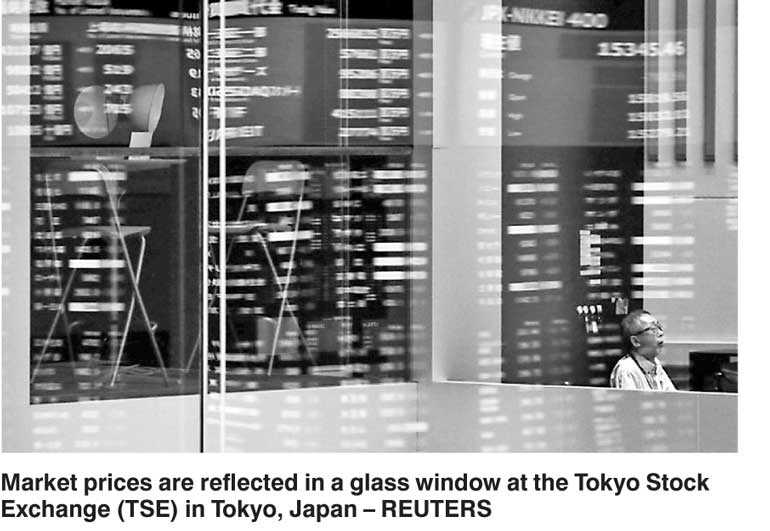Friday Feb 20, 2026
Friday Feb 20, 2026
Saturday, 28 April 2018 00:00 - - {{hitsCtrl.values.hits}}

SINGAPORE (Reuters): Asian shares rose on Friday after US equities were buoyed by a rebound in technology stocks, while markets in Seoul were underpinned by optimism as leaders of North and South Korea held their first summit in over a decade.
MSCI’s broadest index of Asia-Pacific shares outside Japan rose 0.4%, but still looked set to shed 1.2% for the week.
South Korea’s KOSPI briefly rose more than 1% to a one-month high, helped by hopes that the summit could ease tensions over Pyongyang’s nuclear weapons program and pave the way for the North and South to end their decades-long conflict.
South Korean equities later pared their gains to 0.6%, while the South Korean won rose 0.4% against the dollar in onshore trade.
“The easing of tension and the possibility of a peace treaty coming on the horizon are bullish for the won and KOSPI,” said Mingze Wu, FX trader of global payments for INTL FCStone Ltd. in Singapore.
“However, ... it will be difficult to imagine a new bullish trend emerging just from this,” Wu said.
Japan’s Nikkei share average rose 0.6% and touched a two-month peak at one point, getting a boost as chip-related firms rallied after brisk earnings forecasts from Advantest and Kyocera.
The firmer tone of Asian equities came after each of Wall Street’s major indexes rose 1% or more on Thursday, boosted by solid earnings results and a rebound in technology stocks.
Amazon.com Inc shares jumped more than 6% in after-market trading after the online retailer reported a 43% surge in first-quarter revenue.
Facebook surged 9.1% on Thursday after posting an impressive earnings beat, which appeared to calm worries about the fallout from its use of consumer data.
The US 10-year Treasury yield fell 2 basis points in Asia to 2.973%, down from a four-year high of 3.035% set earlier in the week.
The US 10-year yield had edged lower on Thursday as buyers emerged in the wake of a sell-off fuelled by worries over growing US debt issuance and rising costs.
The euro languished near a 3-1/2-month low, having taken a hit after the European Central Bank on Thursday struck a dovish tone as it kept interest rates unchanged.
ECB chief Mario Draghi acknowledged evidence of a “pull-back” from exceptional growth readings seen around the turn of the year, although the central bank sought to bolster expectations for a gradual withdrawal of its monetary stimulus.
The euro edged up 0.1% to $1.2110. On Thursday it hit a trough of $1.20965, its lowest level since Jan. 12.
Weaker-than-expected economic data out of the euro zone has cast some doubt as to how quickly the ECB can head toward policy normalisation and weighed on the euro recently.
“The euro zone’s economy doesn’t seem to have the type of momentum it had last year,” said Satoshi Okagawa, senior global markets analyst for Sumitomo Mitsui Banking Corporation in Singapore.
The dollar, which has drawn strength from the recent rise in US bond yields, held steady against a basket of six major currencies at 91.527. The dollar index had set a 3-1/2 month high of around 91.637 on Thursday. The yen showed little reaction after the Bank of Japan kept its monetary policy steady. as widely expected.
Against the yen, the dollar eased 0.1% to 109.21 yen, inching away from a 2-1/2 month peak of 109.49 yen struck on Thursday.
Oil prices edge lower, but concerns persist about Iran supplies
TOKYO (Reuters): Oil prices edged lower on Friday, but Brent largely held its gains from the previous session amid concerns that Iran may face renewed sanctions, choking off supply.
Global benchmark Brent crude futures LCOc1 were down 29 cents, or 0.4 percent, at $74.45 a barrel by 0302 GMT, after rising 1 percent on Thursday
US West Texas Intermediate (WTI) crude CLc1 fell 28 cents, or 0.5 percent, to $67.91 a barrel. The contract gained 0.2 percent the previous session.
Brent is heading for a third week of gains, up by 0.5 percent, while WTI is set to drop 0.7 percent for the week.
“There’s a little bit of profit taking today,” said Virendra Chauhan, oil analyst at Energy Aspects in Singapore.
“The broader narrative, particularly the strength in Brent, is that people are really concerned about going short oil when sanctions are potentially going to be re-imposed and the market is trying to assess what that means for Iranian exports,” Chauhan said.
US President Donald Trump will decide by May 12 whether to re-impose sanctions on Iran that were lifted after an agreement over its disputed nuclear program, which would probably result in a reduction of Iranian oil exports.
Brent has gained 5.9 percent this month on expectations the United States will renew sanctions.
Concerns about market tightness have also been fuelled by the deteriorating political and economic situation in Venezuela that has led to a 40 percent decline in crude output in the past two years.
Nonetheless, further gains have been capped by rising US production as shale drillers ramp up activity in tandem with the rise in oil prices.
Surging US production, which rose to 10.59 million bpd last week, has encouraged record-high US exports.